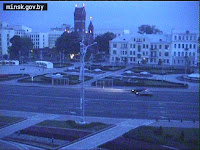The hippocampus in Alzheimer's disease is burdened with amyloid plaques and is one of the few locations where neurogenesis continues throughout adult life. To evaluate the impact of amyloid-beta deposition on neural stem cells, hippocampal neurogenesis was assessed using bromodeoxyuridine incorporation and doublecortin staining in two amyloid precursor protein (APP) transgenic mouse models. In 5-month-old APP23 mice prior to amyloid deposition, neurogenesis showed no robust difference relative to wild-type control mice, but 25-month-old amyloid-depositing APP23 mice showed significant increases in neurogenesis compared to controls. In contrast, 8-month-old amyloid-depositing APPPS1 mice revealed decreases in neurogenesis compared to controls. To study whether alterations in neurogenesis are the result of amyloid-induced changes at the level of neural stem cells, APPPS1 mice were crossed with mice expressing green fluorescence protein (GFP) under a central nervous system-specific nestin promoter. Eight-month-old nestin-GFP x APPPS1 mice exhibited decreases in quiescent nestin-positive astrocyte-like stem cells, while transient amplifying progenitor cells did not change in number. Strikingly, both astrocyte-like and transient-amplifying progenitor cells revealed an aberrant morphologic reaction toward congophilic amyloid-deposits. A similar reaction toward the amyloid was no longer observed in doublecortin-positive immature neurons. Results provide evidence for a disruption of neural stem cell biology in an amyloidogenic environment and support findings that neurogenesis is differently affected among various transgenic mouse models of Alzheimer's disease. ...Am J Pathol. 2008 Jun;172(6):1520-8







0 Comments:
Post a Comment
Subscribe to Post Comments [Atom]
<< Home